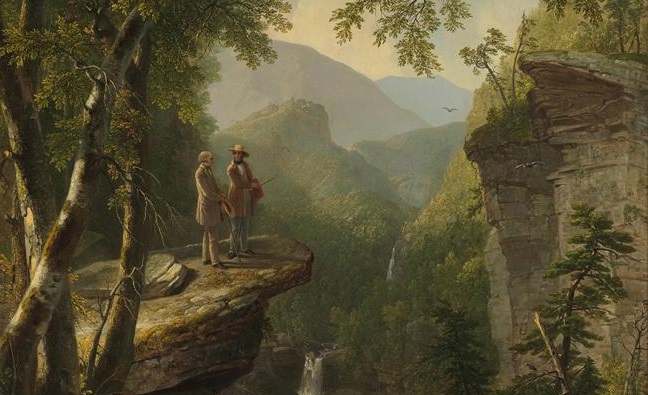
Thursday
I’ve been reading Jay Parini’s Promised Land: Thirteen Books That Changed America (2008), recommended by friend and colleague John Gatta. While it’s not living up to my expectations, it has me reflecting on how literature changes lives.
I should have known I was in for a disappointment when I read the following passage:
This was never meant to be a list of the “greatest” American books: not The Scarlet Letter, The Great Gatsby, or The Education of Henry Adams Although I love poetry, I knew that not even Walt Whitman and Robert Frost, let alone Wallace Stevens or Elizabeth Bishop, had noticeably “changed” America in any significant way (except among that tiny group who actually read poetry). I was looking for books that played a role in shaping the nation’s idea of itself or that consolidated and defined a major trend. Ideally, I wanted books that shifted consciousness in some public fashion, however subtly, or opened fresh possibilities for the ways Americans lived their lives.
With such criteria–note his use of “public fashion”–Parini has necessarily limited himself to expository, didactic and how-to works, such as Of Plymouth Plantation, The Autobiography of Benjamin Franklin, The Federalist Papers, The Journals of Lewis and Clark, Mary Antin’s The Promised Land (an archetypal immigrant memoir),W.E. B. Du Bois’s Souls of Black Folk, Dr. Spock’s Common Sense Book of Baby and Child Care, Dale Carnegie’s How to Win Friends and Influence People, and Betty Friedan’s Feminine Mystique. Plymouth Plantation helped established the American myth, Franklin the American character, Federalist Papers our enlightenment republic, Lewis and Clark America’s sense of manifest destiny, Antin the immigrant dream, and Du Bois the African American challenge. Dr. Spock, meanwhile, changed how parents raised their children, Carnegie how (mostly) men attacked the workplace, and Friedan how women came to see their role as housewives.
The literature Parini mentions is mostly associated with causes and movements: Thoreau’s Walden is a touchstone work for the environmental movement while Kerouac’s On the Road inspired the Beats and then the 1960s Counter-Culture movement. About Uncle Tom’s Cabin, Parini quotes Ann Douglas, who says that it “is a great book, not because it is a great novel, but because it is a great revival sermon, aimed directly at the conversion of its hearers.”
It makes sense, then, that Parini is weakest when it comes to the least didactic literary work on his list. Huckleberry Finn, he says, showed authors the artistic possibilities of the American vernacular, gets us to think about what we mean by freedom, and provides us a model for interracial friendship. That’s all well and good, but it doesn’t set the novel above other American literary masterpieces, which have wielded their own influence and encourage comparable reflection.
Incidentally, given Parini’s view of change, I’m astounded at the omission of one work, not only from his top 13 but also from the 100 other works he includes in his epilogue: Ayn Rand’s Atlas Shrugged. As a novel, it’s far inferior even to Uncle Tom’s Cabin, but it has certainly has had an outsized impact on our politics.
One could respond to Parini with Percy Shelley’s observation (in Defence of Poetry) about the difference between true poets and mere reasoners. While the reasoners can impact surface changes, Shelley writes that
it exceeds all imagination to conceive what would have been the moral condition of the world if neither Dante, Petrarch, Boccaccio, Chaucer, Shakespeare, Calderon, Lord Bacon, nor Milton, had ever existed; if Raphael and Michael Angelo had never been born; if the Hebrew poetry had never been translated; if a revival of the study of Greek literature had never taken place; if no monuments of ancient sculpture had been handed down to us; and if the poetry of the religion of the ancient world had been extinguished together with its belief.
Such poets, Shelley argues, so deeply changed the way we see the world that the two greatest advances in history can be traced back to their visions: the ending of slavery and the liberation of women.
Reception theorist Hans Robert Jauss makes a distinction between great literature and culinary literature. The first changes our “horizon of expectations” whereas the latter leaves our expectations essentially undisturbed. I would argue that the authors Parini (against his wishes) omits from Thirteen Books That Changed America did in fact change the horizon within which the Spocks, Carnegies, Friedans, etc. operated. Their horizons were shaped by Hawthorne, Melville, Whitman, Dickinson, James, Eliot, and others. To cite just one instance, Friedan came trailing clouds of Kate Chopin, Adrienne Rich and others. The greatest literature changes the paradigm itself, lesser literature ferrets out new possibilities within that changed paradigm.
Shelley wrote his Defence in response to the utilitarians of his day, who regarded poetry as nice but peripheral. Parini all but concedes such a view with his view of change.

